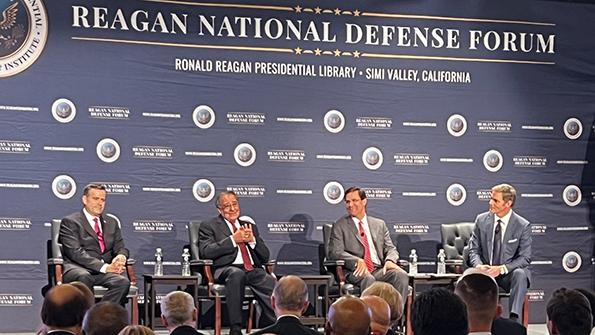
A the Reagan National Defense Forum (from left): former Director of National Intelligence John Ratcliffe, former Defense Secretaries Leon Panetta and Mark Esper and Fox News anchor Bill Hemmer.
This month’s Reagan National Defense Forum provided a good occasion to take stock of year-end sentiment about the U.S. defense posture.
Beyond what one hears at the forum in keynote addresses and from the eminent voices on panels, there is also much to learn from the tenor of chatter among the few hundred who assemble each year on the first Saturday of December at the Reagan Library north of Los Angeles. Not least, this year’s forum was also when the Reagan Presidential Foundation and Institute, which organizes the event, published the results of its fifth annual survey of public opinion about a range of national defense topics. What I heard in these soundings is a great confidence about U.S. national defense, which marks a pronounced change of tune over recent years.
Some part of that confidence no doubt is due to the immediate back-drop of events in the month leading up to the forum. Overseas, the Russian military’s retreat from Kherson and profound civil unrest in China and Iran have combined to put authoritarianism on the back foot. Here at home, by contrast, voters in the midterm elections largely rejected extremists, auguring a period of comparative political stability. And on the very eve of the forum, Northrop Grumman unveiled a game-changer in the American arsenal: the on-schedule, under-budget B-21 bomber, the world’s first sixth-generation aircraft.
The mood at Simi Valley also reflects the largely supportive attitudes of Americans toward national defense as reflected in the institute’s survey of 2,500 U.S. adults taken during the week of Nov. 9.
•Money. Support for increasing defense spending is strong—76% favor it—and consistent across the survey’s previous four years. The big change in sentiment about spending concerns support for foreign aid, which is up 12% over 2021 figures, affirming a policy change that many on stage at the forum contended was an essential element of the Pentagon’s strategy of integrated deterrence.
•Alliances. A strong majority—60% —continue to hold a favorable view of NATO. Adding substance to that sentiment is the fact that 72% affirm the central tenet of the alliance, under which the U.S. is called upon to respond with military force if Russia attacks a NATO ally. What’s more, 61% support adding Ukraine to NATO, a commitment made solemn by awareness that 75% also express concern that Russia may use a nuclear weapon in its war on Ukraine.
•Great Powers. The survey should abate concern that the acute threat of Russia’s aggression in Ukraine will distract Americans’ attention from the century’s pacing threat in the Indo-Pacific region. China remains first on the list of countries regarded as most threatening to the U.S., even after a doubling of those who would place Russia atop it. Moreover, about 60% of those surveyed support enhancing arms sales to and increasing the U.S. military presence near Taiwan.
At the same time, the survey underscores concern that domestic divisions are undermining national security. More of those surveyed believe internal threats present greater danger to the U.S. than those from outside the country, and fully 85% are concerned about political divisions leading to violence. The survey also reveals sharply partisan differences over these challenges:
•Near-term concerns about climate change, which 91% of Democrats hold compared with only 41% of Republicans.
•The sources of a declining trust in the U.S. military, with roughly twice the proportion of Republicans as Democrats doubting the competence of presidential and military leadership and roughly twice the proportion of Democrats as Republicans expressing concern about extremists serving in the military.
•Support for continuing U.S. military and financial assistance to Ukraine, which 73% of Democrats believe we “must continue” while 41% of Republicans believe we “cannot afford.”
These divisions notwithstanding, I found most heartening of all the soundtrack of genuine bipartisanship that pervaded the forum, for which the foundation and institute deserve ample credit. While important differences over policy were hardly swept under the rug, the call to higher purposes—the defense of democracy against global authoritarians and domestic extremists alike and the importance of American leadership and engagement in the world—resounded.
That note rang poignantly through a ceremony at which two exemplars of that calling, former Defense Secretary Mark Esper and former Deputy Secretary John Hamre were recognized for their contributions to the pursuit of peace through strength.
At the end of a year filled with profound challenges to the defense posture of the U.S., the music of its national defense is surprisingly upbeat.
Contributing columnist Steven Grundman is the principal of Grundman Advisory and a former deputy undersecretary of defense for industrial affairs.





